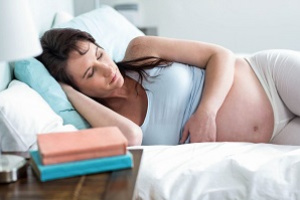Rubella – also known as German measles – can be dangerous for pregnant women. Here’s the information you’ll need.
What is rubella?
Rubella is a viral infection and is usually a mild condition that gets better in seven to 10 days without treatment (NHS Choices, 2018a). Rubella is rare in the UK but if a pregnant woman develops the infection, it poses a serious risk to the unborn baby (NHS Choices, 2018a).
What are the symptoms of rubella?
Symptoms of rubella include:
- a red-pink skin rash made up of small spots
- swollen glands around the head and neck
- a high temperature (fever)
- cold-like symptoms, such as a cough and runny nose
- painful joints (mostly in adults).
(Public Health England, 2013; NHS Choices 2018)
Why is rubella dangerous in pregnancy?
If pregnant women catch the infection during the first few months of pregnancy, their babies could develop birth defects called congenital rubella syndrome (CRS). This causes a wide range of problems, some of which are:
- hearing loss
- brain damage
- heart defects
- cataracts.
(Public Health England, 2013; NICE, 2015)
Rubella is dangerous to the unborn baby if pregnant women catch it during the first 20 weeks of pregnancy as there is no treatment to prevent congenital rubella syndrome.
It’s particularly dangerous during the first ten weeks as catching rubella at this stage can cause miscarriage (Public Health England, 2013; NHS Choices, 2015a; NICE, 2015).
How do you get rubella?
Rubella is caused by a type of virus called a togavirus. It is spread through droplets of moisture when someone who is infected sneezes, coughs or talks. It can take two to three weeks for the symptoms to develop (Public Health England, 2013).
The infected person can transmit rubella one week before symptoms develop, and up to four days after the rash first appears (Public Health England, 2013).
It’s best to call in sick to work for four days after the rash starts to avoid infecting your colleagues and to avoid contact with other pregnant women during that time (NHS Choices, 2015a).
Should I go to a doctor about rubella?
Yes, you should contact your GP or midwife as soon as you develop a rash or come into contact with anyone who has one. Your GP or midwife will arrange for tests to check if you have rubella. In the meantime, avoid any antenatal or maternity setting so you do not come into contact with any other pregnant woman (NHS Choices, 2018a).
How can I stop myself getting rubella in pregnancy?
The best way to prevent rubella is to be immunised with MMR vaccine (NHS Choices, 2018a). MMR vaccination is usually given to children as part of the routine childhood immunisation programme (NHS Choices, 2018a). It’s given in two doses – the first when the child is one year-old, and the second before they start school.
If you’re trying for a baby, it’s good to check that you’re fully protected against rubella. If you’re not sure about your vaccination history, ask your GP practice for your vaccination history. If the record shows that you haven’t had both doses, ask to have it now.
MMR vaccination can cause a risk to your baby during pregnancy, so you should avoid becoming pregnant for one month after taking the vaccine (NHS Choices, 2018b).
Is there a rubella screening test?
In England since 2016, the short answer is: no. The decision was made to stop it because there are very low levels of rubella in the UK. It’s very rare here in pregnancy and getting an MMR vaccine before pregnancy is more effective in protecting women against rubella during pregnancy. The screening test can sometimes also give falsely positive results and cause unnecessary stress among women (Public Health England, 2016).
Rubella treatments
There’s no specific treatment for rubella, but the symptoms normally pass within seven to 10 days. If they’re uncomfortable, some symptoms can be treated at home while waiting for the infection to pass. Paracetamol could help to reduce fever and treat any pains (NHS Choices, 2018c).
This page was last reviewed in February 2018.
Further information
Our support line offers practical and emotional support with feeding your baby and general enquiries for parents, members and volunteers: 0300 330 0700.
To prepare yourself more for what happens during and after labour, we offer antenatal courses which are a great way to find out more about birth, labour and life with a new baby.
You might find attending one of our NCT New Baby groups helpful as they give you the opportunity to explore different approaches to important parenting issues with a qualified group leader and other new parents in your area.
Make friends with other parents-to-be and new parents in your local area for support and friendship by seeing what NCT activities are happening nearby.
NHS Choices. (2018a) Rubella. Available from: https://www.nhs.uk/conditions/rubella/ [Accessed 1st February 2018]
NHS Choices. (2018b) MMR vaccine. Available from: https://www.nhs.uk/conditions/vaccinations/mmr-vaccine/ [Accessed 1st February 2018]
NHS Choices. (2018c) Can I take ibuprofen when I’m pregnant? Available from: https://www.nhs.uk/common-health-questions/pregnancy/can-i-take-ibuprofen-when-i-am-pregnant/ [Accessed 1st November 2018]
NICE (National Institute for Health and Care Excellence). (2015) Clinical Knowledge Summaries. Rubella. Available from: https://cks.nice.org.uk/rubella [Accessed 1st February 2018]
Public Health England. (2013) Rubella: the green book, chapter 28. Available from: https://www.gov.uk/government/publications/rubella-the-green-book-chapter-28 [Accessed 1st February 2018]
Public Health England. (2016) Rubella susceptibility screening in pregnancy to end in England. Available from:https://www.gov.uk/government/news/rubella-susceptibility-screening-in-pregnancy-to-end-in-england [Accessed 1st February 2018]







